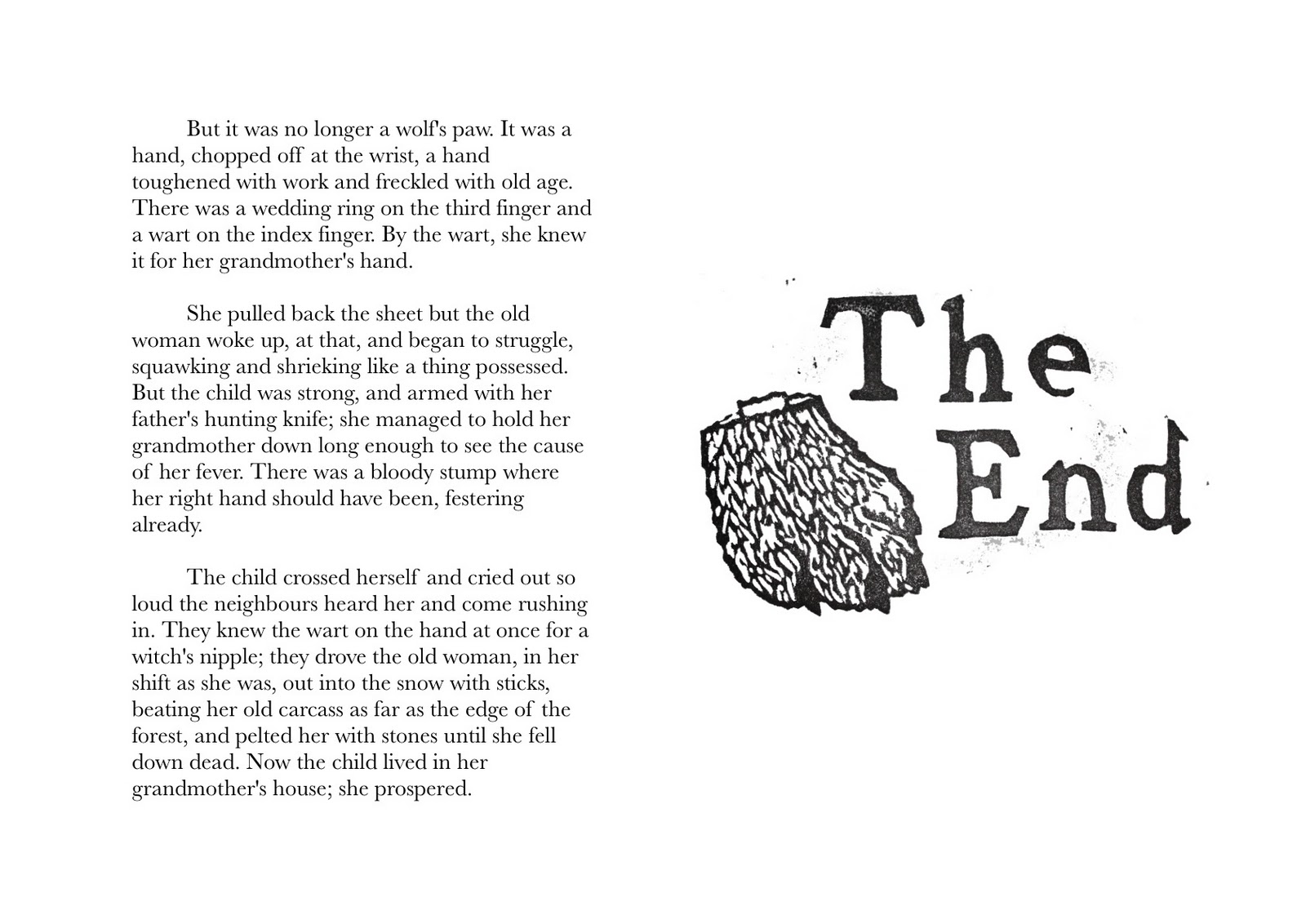
The Werewolf by Angela Carter
The Bloody Chamber (or The Bloody Chamber and Other Stories) is a collection of short fiction by English writer Angela Carter. It was first published in the United Kingdom in 1979 by Gollancz [1] and won the Cheltenham Festival Literary Prize. The stories share a theme of being closely based upon fairytales or folk tales.

Werewolf Angela Carter by Jack Wise
Summary. A child is sent to her grandmother's with oatcakes and butter. She encounters a huge wolf. Unafraid, she draws her knife and cuts off its right forepaw. The wolf limps away and the girl wraps up the paw, placing it in her basket. As snow falls and covers any tracks, the child comes to her grandmother's and finds her unwell.

Jadeth's blog 'The Werewolf' Angela Carter Story.
Angela Carter's "The Werewolf" and the Impact of Story Retold Dino Mušić Sep 4, 2022 6 min read Angela Carter's "The Werewolf" and the Impact of Story Retold Fairy tales present evergreen motifs and ideas, their messages persist through time and remain universally applicable to ever-changing societies.

The Werewolf Angela Carter by MacabreSaturnalia on DeviantArt
Here are the main features which will help you with the analysis of the short story "The Werewolf" by Angela Carter. When it comes to the short story's structure, the text is divided into two main sections. The first section deals with the larger setting, while the second one deals with the little girl's story.

The Werewolf Angela Carter Pdf templatesoftware
The Werewolf. Angela Carter. 24 December 2020 Fiction. It is a northern country; they have cold weather. The cold gets into their bones, their brains, their hearts. Cold; tempest; wild beasts in the forest. It is a hard life. Their houses are built of logs, dark and smoky within; there will be a crude icon of the virgin behind a guttering.

the werewolf angela carter Google Search Red Riding Hood Art, Little Red Riding Hood
The short story "The Werewolf" by Angela Carter has a third-person narrator.The narrator's point of view is primarily limited to what the little girl experiences and presents the events through her eyes:. When she heard that freezing howl of a wolf, she dropped her gifts, seized her knife and turned on the beast (…)

Rebecca Sutherland The Bloody Chamber by Angela Carter
Carter now moves to fairy tales of Northern Europe, where the climate is harsher and the people more solemn. She introduces this new environment by telling tales of wolves. The wolf will be the "beast" of the final three tales, as Carter focuses on wolves that are "hairy on the inside" and live, like her other monsters, on a threshold between wildness and humanity.

The Werewolf by Christina Kingsawan
In Angela Carter's "The Werewolf" (1979), generally regarded as a rewriting of the fairy tale "Little Red Riding Hood" from a feminist perspective, a little girl meets a wolf in the forest.

Little Red Riding Hood. Red riding hood art, Red riding hood wolf, Red riding hood
'The Werewolf' is one of the shortest stories in Angela Carter's 1979 collection The Bloody Chamber. This collection is notable for its feminist take on traditional fairy tales, and 'The Werewolf' is no exception. The story tells of a young girl who injures a wolf on the way to visit her grandmother in the forest,…

Werewolf Angela Carter by Jack Wise
The most important characters in "The Werewolf" by Angela Carter are the little girl, her grandmother, and the collective character of the community living in the northern territory. The little girl is a version of the well-known fairy-tale character Little Red Riding Hood.

Angela Carter’s wolf tales (‘The Werewolf’, ‘The Company of Wolves’ and ‘WolfAlice’) The
Angela Carter's story has some of the familiar trappings of Charles Perrault's version of "Little Red Riding Hood" (1697), such as the granddaughter taking her grandmother a basket of food and an encounter with a wolf. In the original tale the wolf is the villain and the granddaughter is the heroine.

Pin on Silverlake (story)
The title of Angela Carter's story "The Werewolf" is straightforward and creates expectations from the very beginning. A werewolf is a folkloric creature - a human who has the ability to turn into a wolf. Depending on the type of fairy tale or folk story, this might be the consequence of a curse, of being bitten by another werewolf, or it.

Angela Carter The Werewolf Genius
View Details. Request a review. Learn more

Werewolf Angela Carter by Jack Wise
Analysis Bacchilega calls "The Werewolf" the first of "Carter's three 'women-in-the-company-of-wolves' stories." In this story, Carter combines the characters of wolf and grandmother to create a werewolf. In doing so, she suggests that man is not woman's only enemy. Woman collude in and also plot other women's destruction.

The Werewolf Angela Carter YouTube
Winter and cold weather. Go and visit grandmother, who has been sick. Take her the oatcakes I've baked for her on the hearthstone and a little pot of butter. The good child does as her mother bids - five miles' trudge through the forest; do not leave the path because of the bears, the wild boar, the starving wolves.

The Werewolf by Angela Carter YouTube
Angela Carter's "Wolf-Alice," "The Company of Wolves," and "The Werewolf" are examples which transform revolutionary aesthetics strategies usually associated with post-modern fiction to strengthen its feminist political edge. The first section highlights the theoretical frameworks of postmodernism and feminism accordingly showing the different.